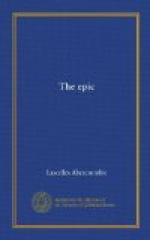So we cannot say that Homer was not as deliberate a craftsman in words as Milton himself. The scope of his craft was more restricted, as his repetitions and stock epithets show; he was restricted by the fact that he composed for recitation, and the auricular appreciation of diction is limited, the nature of poetry obeying, in the main, the nature of those for whom it is composed. But this is just a case in which genius transcends technical scope. The effects Homer produced with his methods were as great as any effects produced by later and more elaborate methods, after poetry began to be read as well as heard. But neither must we say that the other poets of “authentic” epic were not deliberate craftsmen in words. Poets will always get as much beauty out of words as they can. The fact that so often in the early epics a magnificent subject is told, on the whole, in a lumpish and tedious diction, is not to be explained by any contempt for careful art, as though it were a thing unworthy of such heroic singers; it is simply to be explained by lack of such genius as is capable of transcending the severe limitations of auricular poetry. And we may well believe that only the rarest and most potent kind of genius could transcend such limitations.
In summary, then, we find certain conceptual differences and certain mechanical differences between “authentic” and “literary” epic. But these are not such as to enable us to say that there is, artistically, any real difference between the two kinds. Rather, the differences exhibit the changes we might expect in an art that has kept up with consciousness developing, and civilization becoming more intricate. “Literary” epic is as close to its subject as “authentic”; but, as a general rule, “authentic” epic, in response to its surrounding needs, has a simple and concrete subject, and the closeness of the poet to this is therefore more obvious than in “literary” epic, which (again in response to surrounding needs) has been driven to take for subject some great abstract idea and display this in a concrete but only ostensible subject. Then in craftsmanship, the two kinds of epic are equally deliberate, equally concerned with careful art; but “literary” epic has been able to take such advantage of the habit of reading that, with the single exception of Homer, it has achieved a diction much more answerable to the greatness of epic matter than the “authentic” poems. We may, then, in a general survey, regard epic poetry as being in all ages essentially the same kind of art, fulfilling always a similar, though constantly developing, intention. Whatever sort of society he lives in, whether he be surrounded by illiterate heroism or placid culture, the epic poet has a definite function to perform. We see him accepting, and with his genius transfiguring, the general circumstance of his time; we see him symbolizing, in some appropriate form, whatever sense of the significance of life he feels acting as the accepted unconscious metaphysic




